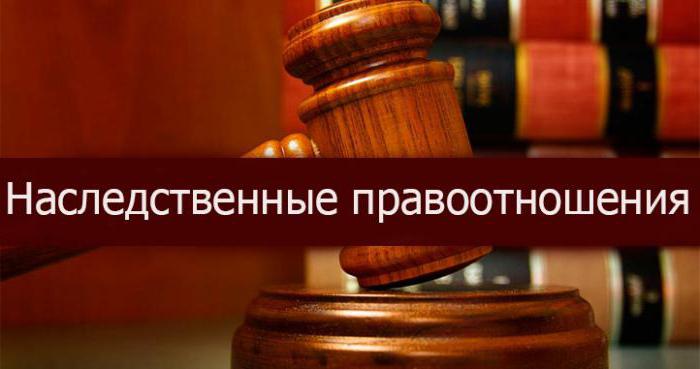Hereditary relations sooner or later affect almost every person to one degree or another. In Russia, practice shows that cases related to inheritance often go to trial. Citizens are not always able to peacefully regulate this issue, and some do not know the basics of receiving and registering an inheritance. Such people may have serious problems in the future. Next, we will study all the important points related to inheritance. In reality, everything is much simpler than it seems. Especially if you comply with the legislation of the Russian Federation.
The concept
What is a hereditary relationship? When and between whom do they arise? The answers to these questions play a huge role.
Relations of a hereditary type are social relations that arise between citizens as a result of the transfer of goods (tangible and intangible) of a deceased person in the order of inheritance. In fact, this is what human relations related to inheritance are called.
We already know the concept of inheritance relations. As soon as a citizen dies, he leaves behind an inheritance. And between the heirs there is a corresponding relationship. What do you need to know about them?
About the heirs
For example, who can claim property? After all, not all close people and friends of the deceased are considered heirs.
In Russia, you can receive property by inheritance:
- to individuals;
- legal entities;
- to the state;
- organizations.
In this case, an individual may be a minor. This is a very common practice.
Among ordinary recipient citizens, it is customary to distinguish:
- relatives;
- third parties.
In general, they consider the relatives of the deceased to be the subjects of hereditary legal relations. The closer the relationship, the higher the chance of receiving property from the testator. But outsiders and even organizations can, under certain circumstances, act as applicants for property.
You should also pay attention to the fact that the subjects of hereditary relations include citizens who were not born at the time of the death of the testator, provided that they were conceived by that time.
Citizenship, legal capacity, the age of the heirs do not affect the right to inherit property. Moreover, the testator himself is not the subject of the studied concept. His legal relationship ends with life.
Grounds
And when do citizens have the right to inherit? There are several options for the development of events, but they all stem from the same basis, namely, the death of the testator.
After a person has died, the heirs are vested with the right to receive property. Death can be either actually fixed or established by the court. It all depends on the specific situation. But ideally, the presence of a death certificate of a citizen allows you to register property by inheritance in the ownership of certain citizens. Thus, the basis of inheritance relations is the death of the testator.
The right to inheritance arises upon opening a testamentary document - this is the second alignment that takes place in practice. The will opens after the death of the testator, and not earlier.
Production methods
The emergence of hereditary legal relations gives citizens a lot of trouble. Especially if relatives do not agree with the will of the deceased or they cannot share the joint property.
You can get the inheritance:
- by law (in order of priority);
- by will.
Usually, testators indicate third parties as well as organizations in testaments. In addition, a will allows you to assign to a specific heir (including blood) a specific property or its share.
About Queues
Hereditary legal relations arising from the opening of an inheritance without a testament have many features. The thing is that if there is no testament document, then citizens will receive property according to the law in the order of priority. As we have already said, the closer the blood relationship is, the greater the chances of obtaining part of the property of the deceased.
The heirs of the first stage include spouses, children and parents. The second - grandchildren, grandmothers, brothers and sisters. Next come the aunts and uncles, nephews, and so on. Usually, things do not get beyond 3 degrees of priority.
Stepdaughters, stepsons, stepmothers, stepfathers are also subjects of hereditary legal relations, just like father-in-law with father-in-law. But they, as a rule, are at the very end of the line of heirs.
Property from the testator is distributed primarily among all applicants of the 1st stage of the waiting order of property. If there are none, then the 2nd, and so on.
Heirs of a longer queue may receive an inheritance when one of the closer applicants renounced their right to register property of the testator as property, and nothing more. That is why the main subjects of legal relations of a hereditary type are close relatives - children, parents, husbands, wives. And only occasionally - grandparents, brothers and sisters and grandchildren.
Right or obligation?
As already mentioned, a citizen, if desired, can refuse the property put to him. This means that inheritance is not an obligation, but a right.
After the opening of the inheritance, the citizen must write a special document in which he writes his will - to accept the property or refuse it. In the first case, relations of a hereditary type will arise. In the second, a person refuses to participate in the inheritance procedure and ceases to be an heir. In fact, he will not enter into a hereditary relationship.
Features of obtaining property
Some believe that inheritance is only a blessing. But actually it is not. That is why some citizens consciously refuse to act as applicants for a share of the property from the testator.
The thing is that in addition to tangible and intangible goods, the objects of hereditary legal relations are the obligations of the deceased. The testator’s debts are also inherited. And this fact should be considered by every potential heir.
Stages
The relations under study, as a rule, go through several stages of development. There are a total of 2. At the first stage, a citizen has the right to inherit property. A potential recipient expresses a will regarding this issue. At the second stage, the right to inheritance is converted into the right to a specific property.
Now consider the features of each stage. In the first step:
- a hereditary relationship appears (it occurs immediately after the death of the testator);
- when a will is opened, heirs have subjective rights to accept property and refuse it;
- the realization of the rights of the heir arises.
The second stage lasts until the fate of the entire inheritance is determined. In this moment:
- there is a division of property between all recipients of the inheritance;
- inheritance rights are drawn up;
- property protection is carried out.
Thus, rights to a specific object appear. In fact, everything is not as difficult to understand as it seems. In practice, inheritance without disputes with other heirs is a fairly simple procedure.
On the right to inheritance
It is also important to understand that inheritance rights are divided into many components. This is due to the fact that different objects pass by inheritance.
So, for example, you may encounter the following inheritance rights:
- property rights;
- law of obligations;
- non-property personal rights.
The right of ownership arises in relation to property and material goods. Obligatory rights usually impose an encumbrance on a person in the form of fulfilling the obligations of the testator. Non-material personal rights are not associated with either things or obligations. For example, this category includes the right to publish a story written by the testator during his lifetime.
Regulation
As soon as the fate of all property is determined, inheritance relations are transformed into civil. All disputes arising from citizens are resolved either peacefully or in court.
The regulation of inheritance relations before the registration of property rights to property is also very often carried out through the courts. This is possible if one of the heirs does not agree with this or that decision and considers it illegal.
Changes in inheritance relationships are made, again, by court or by the good will of the heirs. Usually, the decision to accept the inheritance can be canceled, but to do this is very problematic. In the same way, as well as regain the right to inheritance, if a citizen missed the statute of limitations for the adoption of property.
About the timing
Important: after the opening of the inheritance, a citizen has little time to make a decision regarding the adoption of property. As soon as the testator dies, the countdown of 6 months begins. So much is given under the law to heirs to accept property or refuse it.
If this period is skipped, the heir is automatically recognized as having renounced his rights. You can restore them, but only through court. In real life, the judiciary will return inheritance rights if the deadline is missed for good reason.
Features of obtaining
Hereditary relations sometimes cause a lot of trouble. The thing is that the heirs are private and singular. In the first case, a person receives full ownership of the property, in the second - partially.
The testator may impose certain obligations in favor of the remaining heirs. For example, to provide permanent residence to some recipients of property in inherited housing or to pay them monetary compensation in one way or another. Usually these features are prescribed in the will. If they are not, then the division of property is carried out according to the law, taking into account the will of the deceased.
The order of entry into the inheritance
Now it’s clear when the occurrence of hereditary legal relations occurs. And their features are also not a mystery. How to inherit?
A citizen will have to:
- Wait for the death of the testator and the opening of the inheritance.
- Within six months, write a refusal or accept the inheritance. The corresponding document is executed by a notary.
- Wait for the distribution of property and formalize property rights through state bodies.
If there are no disagreements with other heirs, then inheritance of the property will not cause any problems.
Failures and Shares
You can inherit both shares and the entire property. When inheriting by law, property is divided in equal parts between all the heirs of a particular queue.
If inheritance by will takes place, then the corresponding document should spell out to whom, what and in what parts the will. There is no such record? In this situation, all property is divided in equal proportions between the recipients of the property.
It is impossible to refuse one part of the inheritance and accept the other. A similar alignment is possible if a citizen is simultaneously an heir by law and by will.In this situation, the recipient chooses exactly how to enter into the inheritance.